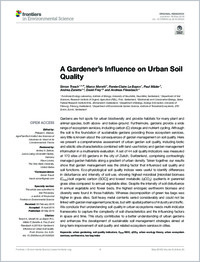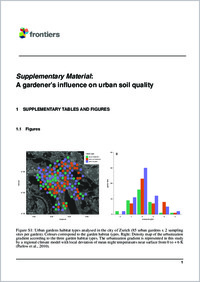A gardener’s influence on urban soil quality
- Tresch, Simon Functional Ecology Laboratory, Institute of Biology, University of Neuchâtel, Switzerland - Department of Soil Sciences, Research Institute of Organic Agriculture (FiBL), Frick, Switzerland - Biodiversity and Conservation Biology, Swiss Federal Research Institute WSL, Birmensdorf, Switzerland
- Moretti, Marco Biodiversity and Conservation Biology, Swiss Federal Research Institute WSL, Birmensdorf, Switzerland
- Le Bayon, Renée-Claire Functional Ecology Laboratory, Institute of Biology, University of Neuchâtel, Switzerland
- Mäder, Paul Department of Soil Sciences, Research Institute of Organic Agriculture (FiBL), Frick, Switzerland
- Zanetta, Andrea Biodiversity and Conservation Biology, Swiss Federal Research Institute WSL, Birmensdorf, Switzerland - Department of Biology, Ecology & Evolution, University of Fribourg, Switzerland
- Frey, David Biodiversity and Conservation Biology, Swiss Federal Research Institute WSL, Birmensdorf, Switzerland - Department of Environmental System Science, Institute of Terrestrial Ecosystems, ETH Zurich, Switzerland
- Fliessbach, Andreas Department of Soil Sciences, Research Institute of Organic Agriculture (FiBL), Frick, Switzerland
- 08.05.2018
Published in:
- Frontiers in Environmental Science. - 2018, vol. 6, p. 25
English
Gardens are hot spots for urban biodiversity and provide habitats for many plant and animal species, both above- and below-ground. Furthermore, gardens provide a wide range of ecosystem services, including carbon (C) storage and nutrient cycling. Although the soil is the foundation of sustainable gardens providing those ecosystem services, very little is known about the consequences of garden management on soil quality. Here we present a comprehensive assessment of urban garden soil quality, including biotic and abiotic site characteristics combined with land-use history and garden management information in a multivariate evaluation. A set of 44 soil quality indicators was measured at 170 sites of 85 gardens in the city of Zurich, Switzerland, comprising contrastingly managed garden habitats along a gradient of urban density. Taken together, our results show that garden management was the driving factor that influenced soil quality and soil functions. Eco-physiological soil quality indices were useful to identify differences in disturbance and intensity of soil use, showing highest microbial [microbial biomass (Cmic)/soil organic carbon (SOC)] and lowest metabolic (qCO2) quotients in perennial grass sites compared to annual vegetable sites. Despite the intensity of soil disturbance in annual vegetable and flower beds, the highest endogeic earthworm biomass and diversity were found in those habitats. Whereas decomposition of green tea bags was higher in grass sites. Soil heavy metal contents varied considerably and could not be linked with garden management practices, but with spatial patterns of industry and traffic. We conclude that understanding soil quality in urban ecosystems needs multi-indicator frameworks to capture the complexity of soil characteristics and the influencing factors in space and time. This study contributes to a better understanding of urban gardens and enhances the development of sustainable soil management strategies aimed at long-term improvement of soil quality and related ecosystem services in cities.
- Faculty
- Faculté des sciences et de médecine
- Department
- Département de Biologie
- Language
-
- English
- Classification
- Biological sciences
- License
- License undefined
- Identifiers
-
- RERO DOC 323802
- DOI 10.3389/fenvs.2018.00025
- Persistent URL
- https://folia.unifr.ch/unifr/documents/307419
Other files
Statistics
Document views: 83
File downloads:
- fre_gis.pdf: 133
- fre_gis_sm.pdf: 115

